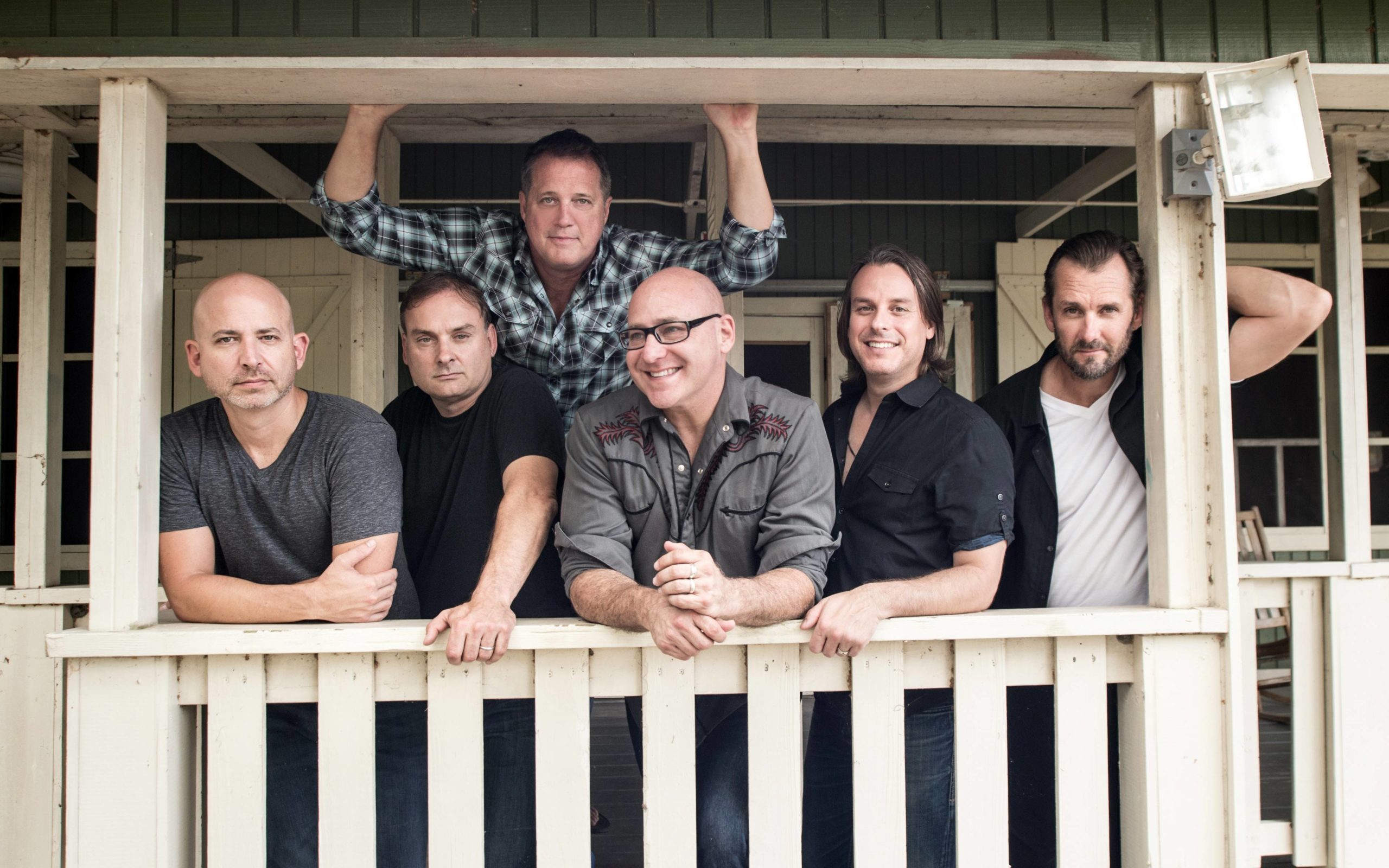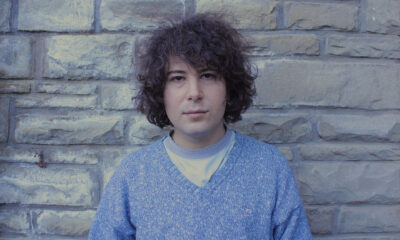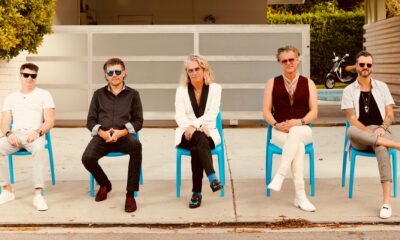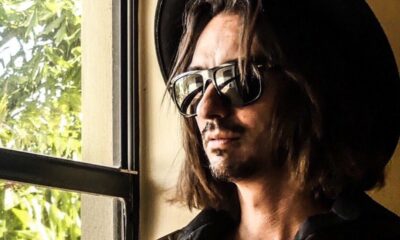Alternative/Rock
Sister Hazel Guitarist Ryan Newell Riffs on the 20th Anniversary of Breakout Album ‘Fortress’

Here’s a way to make you feel old… This past June 27th marked the 20th anniversary since the release of Sister Hazel’s platinum-selling album, Fortress. The record was a big success for the band, best remembered for the singles “Change Your Mind” and “Champagne High,” both of which charted high on various U.S. single charts. It’s hard to believe that it’s been two decades, but it’s not like the group has been on autopilot since Fortress’ release, with seven new recordings issued since, including last November’s Elements, a compilation album of 25 songs that pulls together each song from their Water, Wind, Fire, and Earth EPs. To compose the EPs, the band members brought in some notable musicians and songwriters to assist, including Darius Rucker, Monte Powell, and Barry Dean.
While it may be amazing that it’s been 20 years since the release of Fortress, it may be even harder to believe that it’s been nearly 30 years since Sister Hazel initially formed. Remarkably, here we are, three decades since their formation and the group still contains all of its original members, a feat not to be overlooked in a music industry of constant change and turnover. Not only has Sister Hazel become a persistent force in rock music, but the guys have also been welcomed by the country music audience, with five back-to-back albums listing on the Billboard Top Country album chart.
To get caught up on all things Sister Hazel and to discuss this special anniversary for Fortress, we spoke with lead guitarist Ryan Newell who takes an objective look back on his band’s breakthrough success.
This month marks the 20th anniversary of the release of your formative album, Fortress. It’s obviously been quite a while since you wrote that album… How do you feel about it now looking back on it after 20 years?
Ryan Newell: “I think it is one of our stronger albums. I think the music and production hold up to today’s standards. We were going through a lot of changes as people and I think that emotion was captured quite successfully. Our fans really connect with Fortress, so I guess we did something right.”
With a lot of album and EP releases, you’re certainly a very experienced and skilled songwriter. What do you think Fortress says about you and the band as songwriters now looking back on it? Do you feel it’s some of your best songwriting?
“I think it has some of the best songs Ken Block has ever written. ‘Your Winter,’ ‘Champagne High,’ and ‘Change Your Mind’ to be specific. I co-wrote three songs on the album. I still like those songs, but I personally feel that I developed into a much better songwriter. Ken has as well, but he was writing on a higher level than I was back in those days. He was in a great creative/inspired place when those songs were written, even though he was going through some rough spots personally.”
What do you recall about the songwriting process for Fortress? Give us some insight into what you remember about writing the album and what the process was like.
“We all wrote on our own and collaborated with each other. We would also write some in the pre-production rehearsals. I remember doing demos in my first-ever home studio and sending them to Ken and he would write lyrics. Drew and I combined one of my songs with one of his songs for ‘Shame on Me.’ That’s a weird way to write, but it worked. We did all of the arrangements as a band in rehearsals before we arrived in the studio.”
Fortress was the follow up to your breakthrough 1997 album, …Somewhere More Familiar, which went platinum and really made Sister Hazel a well-known name in rock music. Do you remember feeling a lot of pressure trying to follow up such a successful release with an equally successful and compelling album?
“We felt a ton of pressure! We were second-guessing everything! I joke that it took me a week to find the right stool to sit on (laughs). We weren’t in the best headspace as a band. We were in L.A. for a large part of making that record. Just off a tour that lasted forever and now we were away from home 24/7. As soon as we realized that all we had to do was to be honest and real, things started to come together.”
What track or tracks off Fortress do you look back on most fondly? And as a follow up to that question, are there any songs in hindsight that you would have preferred to leave off of the record?
“I really like the way ‘Champagne High’ came together. I remember feeling like that song gave us the momentum that we needed. Emily Saliers sang on that song and I remember how great it felt to have one of our heroes sing on our record. It would be hard for me to cut any songs from the record because over the last 20 years each song has meant something to someone somewhere.”
What was the band dynamic like when you were writing and recording Fortress? Was it marked by agreement and cohesion for the most part or was it challenging for you all to get on the same page regarding the album’s sound and vision?
“Fortress was by far the hardest record for Sister Hazel to record. We had zero limits on what we could do, who we wanted to do it with, and in a lot of ways we were given enough rope to hang ourselves. For the most part we get along as a band, but at that time we were fighting more than usual. Everything was precious and worth fighting for and we fought over everything. One of our worst fights was over a tambourine part. We were burnt. It was out of control. We forgot we all had the same goal. We had to pack up, come back to the East coast, reset and try again in a studio in Atlanta.”
Moving on from Fortress, let me ask you about Elements, your new 25-song collection that brings together each song from your Water, Wind, Fire, and Earth EPs released over the last two years. Why did you decide to release all four EPs in one collection instead of just leave them each as their own small collection?
“We wanted the EPs to be connected. I don’t know of any other reason than we thought it would be cool and different for our fans to be a part of a two-year experience. At the end of each EP, there is a one-minute song. If you line them all up it becomes one song. That was something we’ve never done before and we’re always trying new things.”
Prior to the release of these four EPs, you had released nine full-length records. Was the idea to now record EPs in response to the current state of the music industry or is it part of a broader plan for the band?
“We love full-length records. That’s what we grew up on. I’m sure we’ll make more, but right now it feels good to put music out more frequently. It’s hard for bands and fans to have to wait so long between records. Releasing new songs more often helps keep momentum and keeps our live set fresh.”
Some may argue that writing EPs is less challenging because they contain fewer songs, but some might say that makes it more difficult because each song has to stand out. What’s your view based on writing the Elements EPs?
“Our main goal is to have each EP feel like a complete journey. No different than a full record. The songs have to work together and be properly sequenced.”
Now, after having experienced releasing a few EPs after having always released LPs, do you think you’ll stick with this format moving forward?
“We enjoy doing both. It really depends where we are in our songwriting process and timing. If we have a group of ten to thirteen good songs ready to go, we’ll put them out. If it’s time to give our fans new music and we only feel strongly about a handful of songs we’ll put out an EP. I think if we focus on the quality of the songs and not putting stuff out just to put something out, our fans will appreciate hearing from us, no matter what format.”
-

 Alternative/Rock12 hours ago
Alternative/Rock12 hours agoThe V13 Fix #010 w/ High on Fire, NOFX, My Dying Bride and more
-

 Hardcore/Punk1 week ago
Hardcore/Punk1 week agoHastings Beat Punks Kid Kapichi Vent Their Frustrations at Leeds Beckett University [Photos]
-

 Alternative/Rock6 days ago
Alternative/Rock6 days agoA Rejuvenated Dream State are ‘Still Dreaming’ as They Bounce Into Manchester YES [Photos]
-

 Culture1 week ago
Culture1 week agoCirque Du Soleil OVO Takes Leeds Fans on a Unique, Unforgettable Journey [Photos]
-

 Music1 day ago
Music1 day agoReclusive Producer Stumbleine Premieres Beat-Driven New Single “Cinderhaze”
-

 Indie1 week ago
Indie1 week agoMichele Ducci Premieres Bouncy New Single “You Lay the Path by Walking on it”
-

 Culture2 days ago
Culture2 days agoDan Carter & George Miller Chat Foodinati Live, Heavy Metal Charities and Pre-Gig Meals
-

 Alternative/Rock1 week ago
Alternative/Rock1 week agoWilliam Edward Thompson Premieres His Stripped-Down “Sleep Test” Music Video












